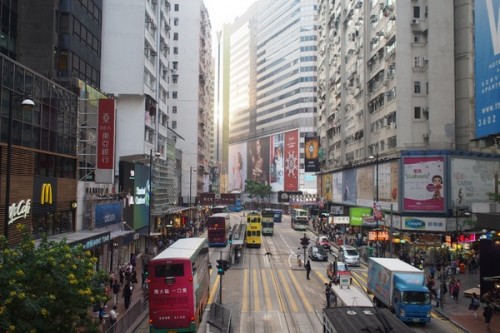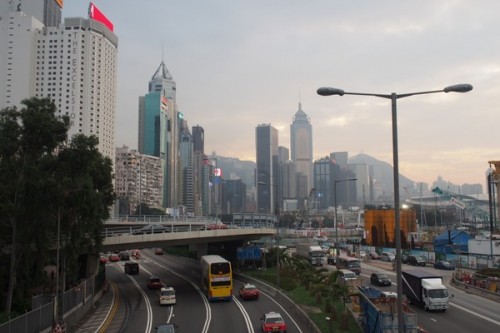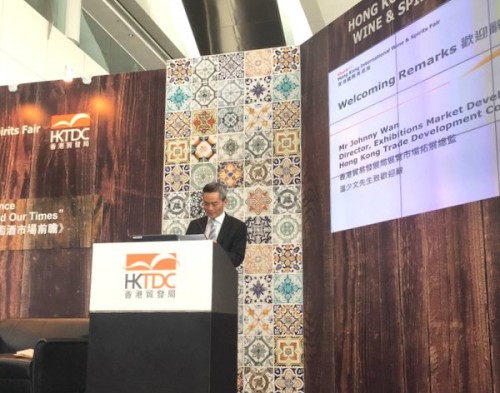
I’m in Hong Kong. My first time here. But only for two days, alas.
The reason? I was giving a talk at the Wine Trade Conference at the Hong Kong International Wine and Spirits Fair. It seems a bit bonkers to fly across the world (and suffer an 8 hour time zone shift) for such a short visit, but it’s the only way I could fit it into a crowded autumn travel schedule.
Besides, I love travelling, and the perspective it brings. Going to new places; meeting new people; being jolted out of comfortable routines. If you are always surrounded by the familiar, it is possible to live life almost automatically – unconsciously – but the forced change travel imposes allows you to take a step back and see things very differently. You can’t help but be conscious in an unfamiliar place.

So, Hong Kong. I’ve had a very brief introduction to this remarkable place. Bustling, busy, new, old. It’s only when you actually visit a place that it all seems to make sense. Just bring lots of business cards. Fortunately, I did, but one of my colleagues here came without any at all. Big mistake!

My talk? I was asked to speak about the future for Bordeaux En Primeur. It’s not a subject I’ve got any personal expertise on: I don’t go to the primeurs for a range of reasons. But I’m quite good at research, so I asked the opinions of some of the key players, and then synthethized those. The message? In a nutshell, it’s an excellent way of distributing wine, and it’s also a low margin model that enables the Chateaux to get their wine out to their customers quickly and without the need for each to employ a sales team. The courtiers take their 2%, negociants 10% and merchants 10%. The problem now is that the system is out of balance and the prices the Chateaux are asking are too high. For example, Berry Bros & Rudd, the UK’s biggest player, turned over £100 million in 2009, £60 million in 2010, but just £7 million in 2013. 2011-14 were all disappointing campaigns. And they make only 3% profit on their turnover. If the Chateaux don’t get their pricing right, they are going to kill this brilliant system for selling wine.
I was followed by Judy Chan of Grace Vineyard in China. Judy’s talk was super-interesting. After all, everyone is interested in hearing about what is really going on with wine in China. Judy joined the Chinese wine industry in 2002, so she’s seen a lot of change, and the she says that in China it is both good times and bad times for the wine industry at the moment. 10 years ago there were only a handful of wineries in China: now, China has nine different wine regions with lots of wineries. In Ningxia alone there are more than 300 wineries.
Judy thinks that they key to success for all these producers is to start marketing their wines to people who aren’t currently drinking wine. ‘The China wine market is still growing and very positive,’ she says, ‘but wine drinkers in China are still a very small group. It’s a big mistake if we try to target wine lovers. We should try to target people who don’t drink wine at the moment.’
She says that online sales in China are pretty convenient. Within a province, you can get your wine the next day; across provinces, you can get it within 6 days maximum. One of the advantages of online sales is that it gives wineries lots of free information about their customers. Wechat, one of the leading social media platforms in China, has an online store. If you like a post, you can simply click to order.
Last month Grace launched a sparkling wine called Angelina exclusively through its Wechat online store. Judy chose to promote this only through social media with no advertising, as a sort of experiment. It has sold well. She also mentioned the impact of the Chinese anti-corruption campaign. In the past, a lot of wine sales were through kick backs, rebates and having friends in government, she says. This has caused a lot of players to leave the industry. ‘You see the birth of the real consumer,’ says Judy.
So, it’s my last couple of hours here in Hong Kong. It has been a good experience, and I’m sure I’ll be back to explore the wine scene here in more detail.
2 Comments on In Hong Kong
What Judy hasn’t mentioned (or maybe she did) is that good, or maybe better to say ambitious Chinese wines tend to cost an insane amount of money. I was in Ningxia during the harvest for the Wine Challenge and I was amazed to learn that the cheapest wines are sold at what we could define supepremium prices in Europe (7/8 euros wholesale) and the top ones are sold at euros 50 -100 or more. Talking to a person that works for one of the biggest wine importer and distributor in China, I have been told that they don’t sell Chinese wines at the moment because of the unsustainable prices asked. I have seen a lot of stock of unsold wines at wineries warehouses, it just doesn’t move at those prices. On the other hand, making wine in a place like Ningxia is very expensive, twice or more as much as in other main areas of the world. All very interesting but it looks a bit unsustainable in the long term, at least for top wines.
Is BBR turnover really down from £100m to £7m in 4 years ?